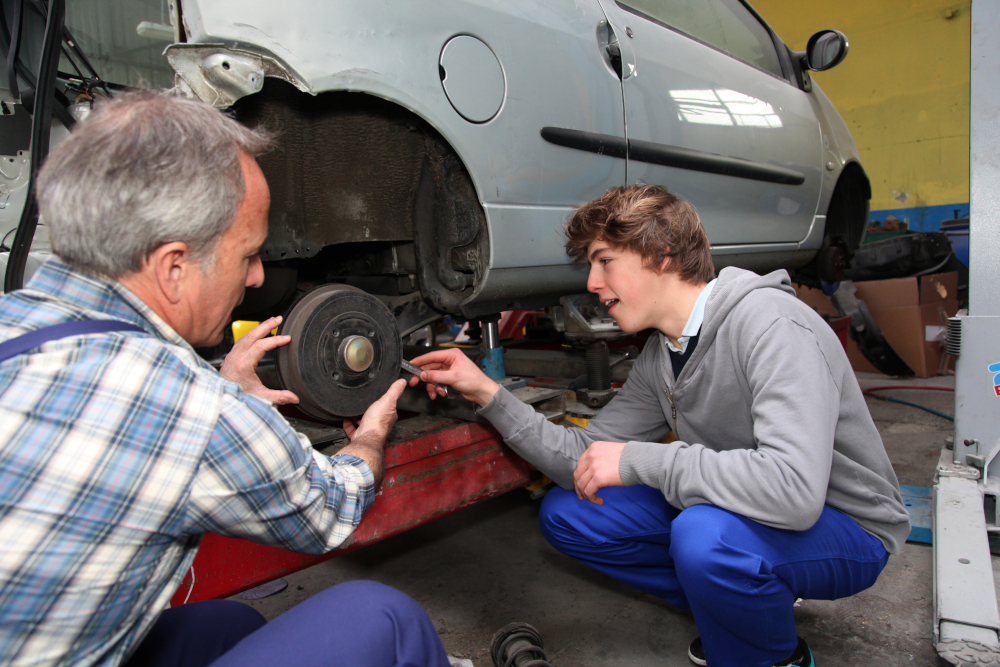
Bornemissza Gergely Secondary Vocational School and Dormitory of the Eger Centre of Vocational Training is maintaining active relations with domestic as well as foreign chambers, businesses and school workshops. Also engaged in technical vocational education and training, the school seeks to meet labour market demands this way, too. Besides that, of course, they also keep an eye on the needs and goals of the students, the teachers, the management and the institution. Talking about the VET mobility project of 2015, we asked Project Coordinators Mária Fábiánné Kovács and Gabriella Dorkóné Liptai about the challenges that it presents.
What company and chamber relations do you have?
Our school provides training in vocations related to the construction industry, the wood industry, the light industry and the automotive industry, so our school primarily maintains relations with the Heves County Chamber of Commerce and Industry, as well as with small and large companies located in the county. In the field of car repair, our largest partner is the Eger Regional Directorate of the Transport Centre of Central Eastern Hungary, as well as a number of local car repair businesses and entrepreneurs.
How can you leverage your relations with the chambers?
In the field of VET, due to the training structure, each vocational training centre and each partner institution must have relations with the chambers. An essential criterion of relying on our relations with the chamber is that there should be excellent cooperation between the school and the chamber. Since our EU accession, each Hungarian chamber has developed their own foreign professional relations, as they, too, have applied with programmes in order to send their members out to the world for experience exchange. We suggest that the project management should contact the chamber representatives, describe them the contents of the actual project, and ask them for help by writing a letter of recommendation to their foreign partner chambers. In Germany, for example, the chambers have dedicated departments for foreign partners, including Erasmus+ applicants.

Is it more useful to plan professional practice in a company or at a school workshop?
Our students have done professional practice in foreign companies as well as the workshop of the chamber's training centre. We’ve seen the advantages of both. In a school workshop, the instructors speak the students’ language better, and they better cater for what interests them. The students are together, and those who speak the language to a lesser extent can manage better, too. The German chambers have very well equipped training centres. In these centres not only VET students spend a few weeks a year, but also ones preparing for their mastership examination or higher professional qualifications. Here, they can meet the latest technologies, materials and machines. When we still hadn’t seen a real 3D printer here at home, our students already had. Such machines are scarcely found in small enterprises. Our specialist teachers who accompanied the students were amazed to see these workshops; they could also try new procedures and machines, and they also got some inspiration for the work pieces to be manufactured.
In a company, however, it can be clearly seen how work is organised and how they keep contact with their customers. Relationships can be established for later experience exchange. Each business or company received no more than one or two students, so besides language use, our students also needed to cope with the challenges of independent work.
 What feedback did you get about the foreign practice from Hungarian workshops and instructors?
What feedback did you get about the foreign practice from Hungarian workshops and instructors?
After the completion of their foreign practice, students always give an account of their experiences to the instructors, peers and the teaching staff. The instructors and company heads of the external practice partners, as well as the chamber, are also invited to these events. On one occasion, the instructor also applied to participate in the next such trip, because he’d found the student's experiences very interesting and he wanted to keep pace with the technical advances.
How would you explain the difference between monitoring and assessment to a first-time applicant?
For us, monitoring means personal reassurance and supervision. How are students accommodated, how can they get to their workplace? What circumstances will students find at their workplaces, and how do they feel? Assessment is a revision of the project processes. Is everything going according to the plans, why we have deviated from the original plan, was it justified, or were we forced to deviate? Do we need to modify our plans next time or not? For that, we prepared various questionnaires and assessment sheets, and we also interviewed our foreign partner.
Why is assessment so important to you?
Assessment gives us an objective picture of the completion of each project phase, and it also provides an opportunity to reveal potential deficiencies or to pat each other on the back when we did something right. We can show our achievements to our colleagues, students, the parents, the operator, as well as the chamber, through the assessment tools we have developed. Knowing our achievements, strengths and areas that need improvement will also be very important when implementing our next projects.
What are the most important methods and stages of assessment that you consider indispensable?
We made a schedule for the entire duration of the project, in which we assigned activities, deadlines, responsible persons and documents to be produced or outcomes required to each project phase in a chronological order. After closing each phase, we prepared a simple assessment report, describing the actual outcomes or shortcomings. We consider it very important that the participants of the project should also assess each area. Therefore, the foreign hosts assess the students on the assessment sheet that we prepared, we ask the parents for feedback after the professional practice, and the students also assess the requirements and their fulfilment. We also report all this to the teaching staff, using charts and diagrams.
How did the parents relate to the project? How much did they know about the opportunity of the E+ professional practice?
Parents regard professional practice abroad as an opportunity which they can’t ensure but the school can. First we only informed them about the professional practice through our students, and then also personally before application. They’re not familiar with the Erasmus+ programme; most of them first heard about it at the school. The parents take their decisions to let their children apply seriously, which is also reflected in the low dropout rate.
How can you maintain good relations with the parents, and why is it important for the school?
Parents are the school's most important partners, and such trips also have risks. The students mostly travel to their workplaces on their own, and they also manage their grant independently. Few of the students have formerly been abroad, and even then, they didn't need to be self-sufficient. That’s why parents’ approval, support and satisfaction are immensely important. We inform them of everything and organise meetings with them, because they must see that their children will be part of an elaborate and well-organised project, and when abroad, they will be supervised by experienced and reliable colleagues who speak the language fluently. The students are accommodated at the same place as the accompanying teachers, who are always available, so the parents let even minors go with a light heart. They greatly appreciate receiving exact and straightforward information about travelling and staying abroad. Like their children, many of them are inexperienced in this field; still, they can do lot to help students face the challenges of the professional practice abroad with self-confidence and well-prepared.
School website:http://www.bgeger.hu/
Last modified: 19-06-2019















